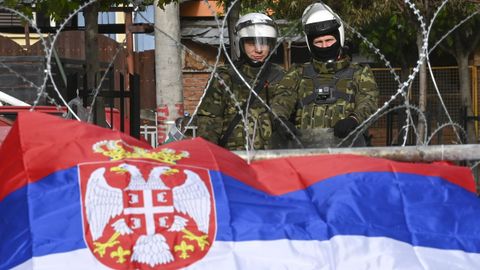
NATO soldiers in the town of Zvečan in Kosovo GEORGI LICOVSKY | EFE
The elections were the trigger for a new crisis between the Kosovo authorities and the Serb minority in Kosovo
The European leaders They do not want to allow a new outbreak of violence in Kosovo and have decided to do something about it. On Thursday, several European leaders asked Kosovo President Vjosa Osmani and the Serbian leader at a mediating meeting on the sidelines of the European Political Community summit held in the city of Bulboaca, Moldova. Aleksandar Vucic, repeat of last April’s municipal elections. The elections were the trigger for a new crisis between the Kosovo authorities and the Serb minority in Kosovo, which boycotted the elections.
The tension escalated into riots last week when hundreds of protesters The Serbs prevented the election of the mayor four municipalities in the north of the country take their positions. The vast majority of the population of these Serbian cities decided to boycott the elections, which resulted in a turnout of only 3.4 percent. The Serbian community does not recognize the Kosovo authorities as legitimateThe region unilaterally declared independence from Serbia in 2008. Since then, it has been recognized by only slightly more than half of the UN countries, including Serbia.
The Kosovo police tried to guarantee the inauguration of the mayor, which caused serious clashes involving members of KFOR, a peacekeeping mission deployed 24 years ago, made up of soldiers from the US and EU countries. The the most violent clashes took place last Mondayresulting in more than 80 injuries, including 30 KFOR soldiers.
In addition to the top leaders of Kosovo and Serbia, the high representative for the EU’s foreign policy also participated in the high-level meeting in Moldova. Josep Borrell, German Chancellor Olaf Scholz and French President Emmanuel Macron. “What we asked from both sides is very simple, the organization of new elections in these municipalities as soon as possible. Four mayors were elected with votes of less than 5% of voterswhich is clearly not a condition of legitimacy,” Macron said at the end of the meeting.
Scholz expressed himself in a similar way: “Courage is needed on the part of all involved because they will have to do their part in their positions of political responsibility ensure that de-escalation is successful». However, in the hours after the mediation attempt, the protagonists did not show that they were ready to make concessions. President Osmani insisted on repeating the narrative of Pristina, which denies the political conflict and attributes the unrest to the problem of public order. At the press conference, the leader of the Kosovo Albanians criticized Vučić for supporting some protesters, whom she called “criminal groups”.
ten years of negotiations
Serbian and Kosovo authorities They have been negotiating some kind of recognition for more than a decade mutually with the mediation of the EU. In fact, in 2013 they reached a declaration of principles known as the Brussels Agreement. However, both sides disagree on the interpretation of one of its main points. While the Serbian side believes that the text includes the creation of an autonomous Serbian entity within Kosovo, Pristina claims that the agreement only recognizes the possibility of mutual coordination between municipalities with a Serbian majority, but not the formation of an executive power.
Source: La Vozde Galicia
I am Amelia James, a passionate journalist with a deep-rooted interest in current affairs. I have more than five years of experience in the media industry, working both as an author and editor for 24 Instant News. My main focus lies in international news, particularly regional conflicts and political issues around the world.







